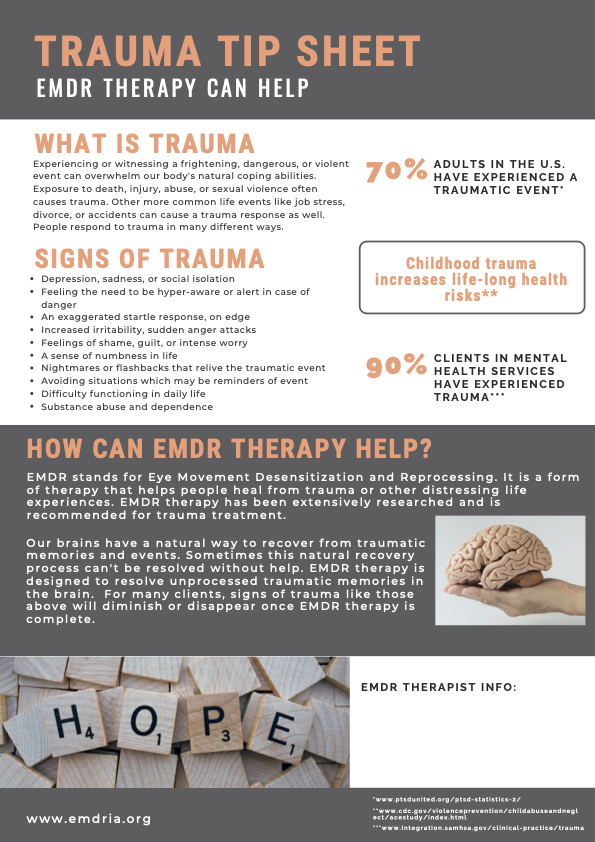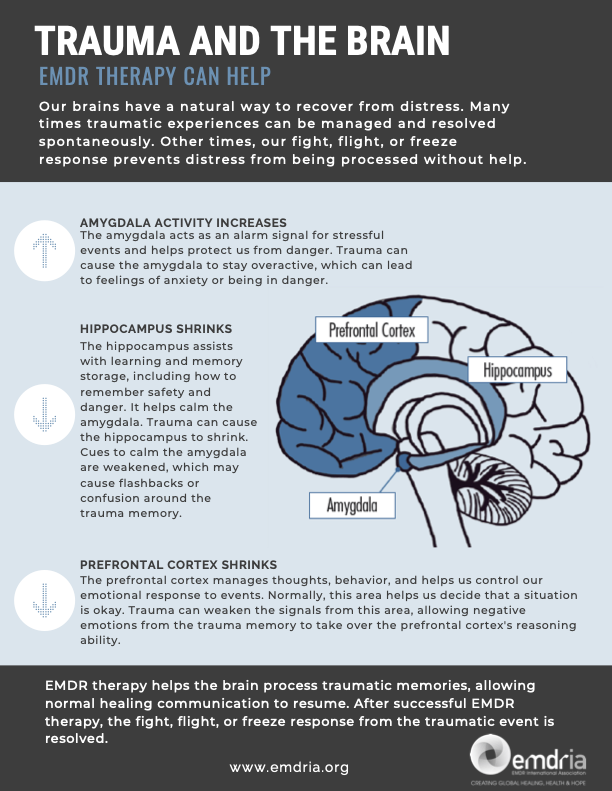EMDR Trauma Therapy
What is EMDR?
Eye Movement Desensitization and Reprocessing (EMDR) is an integrative psychotherapy approach that has been extensively researched and proven effective for the treatment of trauma. To date, EMDR therapy has helped millions of people of all ages relieve many types of psychological stress.
When individuals experience trauma, have upsetting experiences or repeated failures, they may lose a sense of control over their lives. This can result in symptoms of anxiety, depression, irritability, anger, guilt, and/or behavioral problems. Events such as accidents, abuse, violence, death, and natural disasters are distressing, but we do not always recognize the ways they effect and influence everyday life. Even common upsetting childhood events, such as divorce, school problems, peer difficulties, bullying, and family problems, can deeply affect an individual’s sense of security, self-esteem and development.
When an upsetting, scary or painful experience happens, sometimes the memory of the experience stays “stuck” or “frozen” in the mind and body. The memory of the experience may return in a distressing and intrusive way and the individual may cope by avoiding everything associated with the upsetting experience. For example, an individual who has experienced a bad vehicle accident may have repeated nightmares, be fearful of trying new things, and avoid things that are associated with vehicles, such as driving.
Most experts agree that the best way to get “unstuck” and become free from the symptoms is through exposure to the distressing experience. This means the person will work through facing the memories or troubling events until they are no longer disturbing. In EMDR, therapists use alternating, right-left tracking that may take the form of eye movements, tones or music delivered to each ear, or tactile stimulation, such as alternating hand taps, to address the upsetting material.
Exactly how EMDR works is not really known. We do know from memory and brain research that painful or traumatic experiences are stored in a different part of the brain than pleasant or neutral ones. Normally, if we’re troubled by something, we think about it, talk about it, perhaps dream about it and eventually we are able to come to some sort of adaptive resolution (We find a way to come to terms with it in a healthy way, enabling us to put it behind us.) Something happens that interrupts this process when we experience a trauma or very painful event. Instead, the distressing material gets *stuck* in the brain and remains in its original form, with the same thoughts, feelings, bodily sensation, smells and sounds. It’s as though it is sealed off from the healthy, functioning brain.
What researchers think is that EMDR in some way is able to ‘nudge’ that material so that it reconnects with the healthy brain and then is reprocessed and integrated at an accelerated speed. The most popular theory is that when the eyes move back and forth it creates brain activity similar to that which occurs during REM (rapid eye movement) sleep. It’s during this REM phase (when we dream) that we resolve conflicts, process information and consolidate learning and memory. More simply put, information processing takes place. By creating similar brain activity, while thinking about the painful event, it appears that EMDR is able to help the brain finally process the *stuck* material, enabling the person to arrive at an adaptive resolution; the painful event or trauma becomes an unfortunate memory but it no longer produces the emotional pain that it did before.
What kind of problems can EMDR treat?
Scientific research has established EMDR as effective for post traumatic stress. However, clinicians also have reported success using EMDR in treatment of the following conditions:
- traumatic experiences
- disturbing memories
- anxiety/phobias
- panic attacks
- performance anxiety
- depression
- complicated grief
- dissociative disorders
- pain disorders
- eating disorders
- addictions
Is EMDR right for me?
A simple-enough question, but there’s no simple answer. The best way to answer this question is to talk to me and see if I can help. After the initial assessment of you and your situation, we will usually have a good idea of whether or not EMDR can be helpful.
Learn more about EMDR: EMDRIA.org


